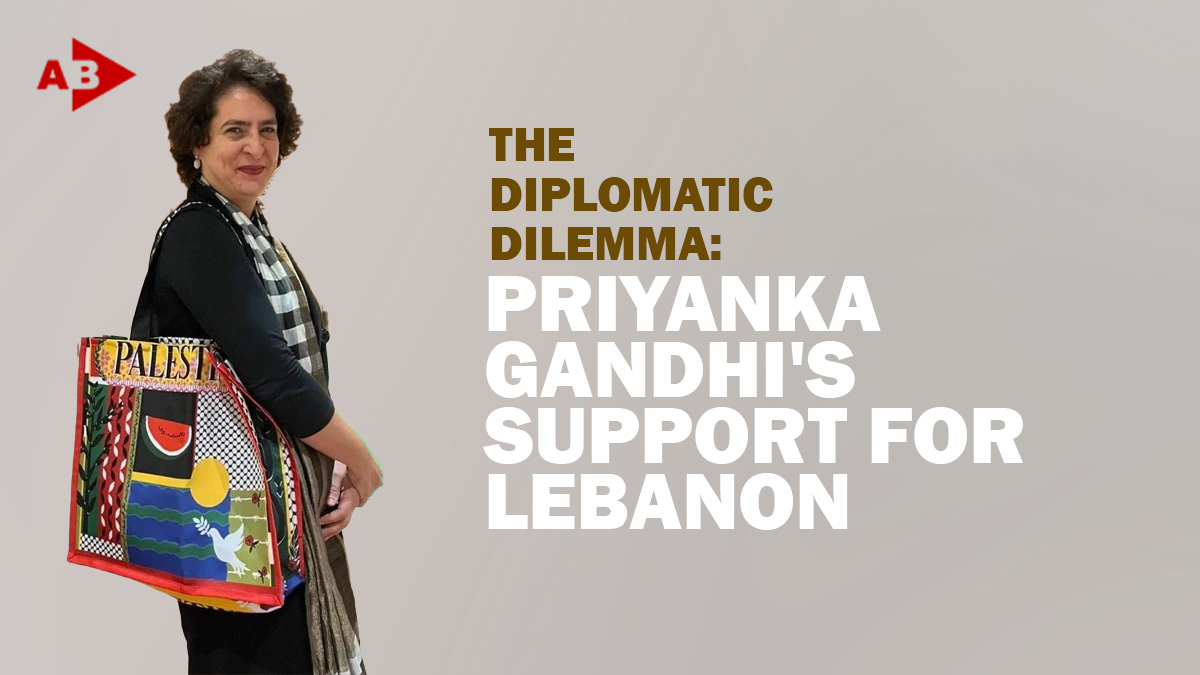
As Priyanka Gandhi Vadra champions Lebanon, concerns arise over potential rifts in India’s historically stable ties with Israel, impacting diplomacy and regional security.
Priyanka Gandhi Vadra’s recent support for Lebanon raises concerns about its potential impact on India-Israel relations. As India navigates its diplomatic balance, this development highlights the risks of political divisiveness during a time of geopolitical tension. Explore the ramifications of this controversial stance on India’s foreign policy and regional security.
Jotirmoy Roy, AB News, New Delhi: Congress MP Priyanka Gandhi Vadra recently made headlines by entering Parliament with a bag prominently displaying the word “Palestine.” This eye-catching accessory showcased symbols of solidarity with the Palestinian cause, including a watermelon—a well-known emblem of resistance in the region. While her gesture appears to be rooted in humanitarian concern, it raises substantial challenges for India’s longstanding relations with Israel, a crucial ally in the arenas of security, defense, trade, and technological advancement.
Historically, the ties between India and Israel have been characterized by mutual respect and cooperation across various sectors. The two nations have worked collaboratively to enhance national security, foster trade relations and develop scientific advancements. Priyanka’s decision to vocalize support for Lebanon, however, has introduced an element of unpredictability that could jeopardize this delicate balance. Her actions, although well-intentioned, may unintentionally fuel tensions and misunderstandings.
By publicly expressing solidarity with Lebanon during a time of heightened sensitivity surrounding Middle Eastern politics, Priyanka Gandhi risks altering the perception of India’s foreign policy. Traditionally, India has maintained a careful stance on Middle Eastern conflicts, emphasizing a commitment to counterterrorism while striving to uphold its diplomatic relationships. This recent departure could undermine India’s historical dedication to addressing terrorism and other geopolitical issues.
Furthermore, the timing of Priyanka’s statement is crucial. With India striving to solidify its relationship with Israel, her support for Lebanon may cause apprehension among India’s allies who view Israel as a strategic partner. This may also encourage neighboring countries, particularly Pakistan and China, to exploit this situation, amplifying their narratives against India in the international arena.
In addition to the foreign policy ramifications, Priyanka’s stance could lead to internal discord within the Congress party. Political unity is paramount, especially in a climate where divisive rhetoric can hinder effective governance. As debates heat up around this controversial support, dissent may surface among party members who have differing views on the issue, potentially challenging Congress’s unity.
The implications of this development extend beyond politics; they pose a serious threat to India’s diplomatic standing. Increased tension in India-Israel relations could instigate an unfavorable environment for security and economic development within the country. The Indian leadership must reflect on these actions diligently, ensuring that national interests are prioritized.
Israeli Ambassador Reuven Azar’s remarks highlight the need for a nuanced approach to support Palestinian causes while remaining firm in distancing from terrorist organizations. He reiterated that India and Israel share common values and interests, emphasizing the importance of collaborative projects, including the hosting of 50,000 Indian workers in Israel and ongoing partnerships in agriculture and defense technologies and also collaborating in the areas of AI.
As India grapples with the intricate dynamics of its diplomatic relationships, Priyanka Gandhi’s bold move in support of Lebanon may be viewed as a serious threat, challenging the nation’s political cohesion, economic stability and territorial security. The unfolding consequences of this decision warrant close scrutiny as India navigates the complexities of an ever-evolving international landscape.


